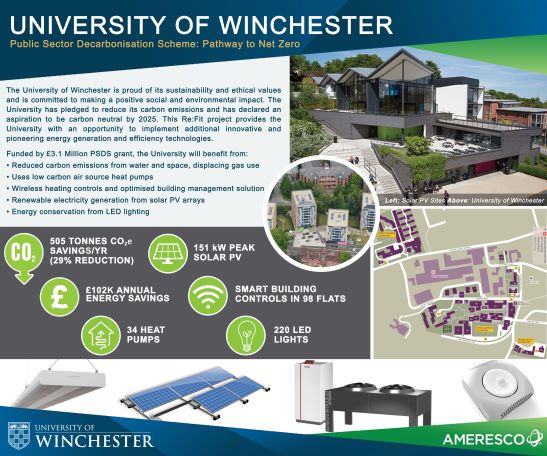The University of Winchester is set to become one of the lowest carbon emitting universities in the UK, following the award of a £3.1 million grant from the Public Sector Decarbonisation Scheme (PSDS).
The grant signals the start of a major capital investment programme by the University in innovative low carbon plant and equipment.

Phase 1 of the programme will see the replacement of 35 gas boilers with low energy heat pumps; a lighting upgrade to replace existing older-style lighting with low energy LEDs; an upgrade to the Building Management System to optimise energy consumption in buildings; and the installation of two large solar photovoltaic arrays designed to produce on-site generation of electricity at peak times.
"Once installed, the low carbon plant and equipment will support savings of over 500 tonnes of carbon dioxide a year, with Scope 1 and 2 emissions falling to almost zero, which equals financial savings of up to £100k" said Gavin Hunter, Chief Operating Officer, University of Winchester.
"The University of Winchester is one of a number of universities to be awarded PSDS funding in the first round. The grant underlines the significant progress the University has made since 2006 when we began to move away from fossil fuels and invest in energy efficiency measures, installed renewables, switched to electric vehicles and purchased renewable electricity and gas. As the University for sustainability and social justice, we are proud to have been an early adopter within the higher education sector taking action to reduce our environmental impact."
Mat Jane, Head of Environment and Building Services at the University, said: "Our target to be carbon net zero by 2025 is ambitious, given many companies are targeting 2030 and the Government's goal is 2050. Not taking into account purchasing renewable energy, the University has reduced its carbon footprint by 65 per cent relative to the size of the estate to date, which is a huge achievement, but there is much more work to do."
The new low carbon plant and equipment will save a total of 2,702,353 kWh a year:
Chris Ronketti, Director at Carbon Intelligence, said: "Investment in low carbon heat and energy infrastructure will be essential to meeting the UK's target of reaching zero emissions in buildings by 2050. This successful grant application involved long-term asset thinking, integrating carbon into the decision-making process. It has been a pleasure working with the team at University of Winchester as they take the last steps to achieve fossil fuel-free status."
Kirsty Adamson, Programme Manager at Salix, which provides Government funding to the public sector to improve energy efficiency, reduce carbon emissions and lower energy bills, said: "We're delighted to be supporting the University of Winchester with their PSDS carbon reduction project. The project demonstrates the University's commitment to decarbonise their estate by reducing the overall energy demand of their buildings and switching away from fossil fuel-based heating systems. We are looking forward to continuing our relationship with the University and supporting them with their Net Zero plans."
The University purchases 100 per cent renewable electricity, 100 per cent green gas and has switched 47 per cent of its fleet vehicles to electric as part of its journey towards its target of net zero carbon emissions by 2025. New buildings such as the flagship West Downs Centre, which opened in July 2020, meet stringent environmental criteria and are ethically financed.
The programme of works is due to be completed by Autumn 2021. Energy infrastructure specialist Ameresco will manage the implementation, with support from Carbon Intelligence.
Press Office | +44 (0)1962 827678 | press@winchester.ac.uk | www.twitter.com/_UoWNews
Back to media centre